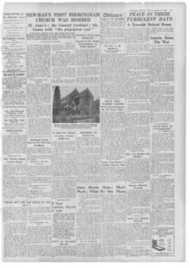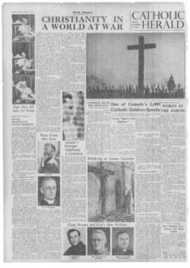Page 6, 27th December 1940
Page 6

Report an error
Noticed an error on this page?If you've noticed an error in this article please click here to report it.
Tags
Share
Related articles
Catholic Profiles: 60
Finding Out About St. Thomas
The Everlasting Man Returns
Aquinas Papers
Leicester Aquinas Society: 1935-1936
Philosophy
Not for then
but for now and forever
St. Thomas Aquinas. By Gerald Vann, O.P. (Hague and Gill, 6s.).
Reviewed by THOMAS CORBISHLEY,
CHESTERTON somewhere has a remark abdut those people who are " under the impression that they hare read the ' Origin of Species: " Amongst Catholics —not excluding the learned—there is probably a higher proportion of individuals who are under the impression that they have read—or, at least, are adequately acquainted with—the Summa of St. Thomas. Ever since Leo XIII issued his instructions about the place of Thomism in Catholic teaching, the growth of interest in St. Thomas has
indeed progressed ; but no one will fail to benefit from this stimulating (and, incidentally, beautifully printed) work by Fr.
t
Enomising and, inevitably distorting, we tray perhapsstate Fr. Vann's central thesis thus. The failure of the Western world is due almost entirely to its neglect of the Thomist synthesis. For, contrary to what so many moderns think, that synthesis is no " dated system '': it is capable of assimilating all subsequent discovery and, whilst adjusting itself to new conditions, to retain its own substantial identity. As the organic metaphysical verity, centred in God and moving out from that centre to lay down the lines of an explanation of man's nature and purpose, it is a system not for this or that age, but for all time: more, because of St. Thomas' peculiar position in history and his peculiar advantages of firth and education, he was capable of producing a scheme of thought that might appeal to both West and East alike. And Fr. Vann sees great tragedy in the fact that St. Thomas died on his way to the Council of Lyons. That might, it would seem, have been his great chance of linking East and West, of making his " school " a worldwide affair instead of becoming the " exclusive concern of a caste."
IT is an entrancing hypothesis. But if it
is true, it would seem that the causes of the breakdown of Thomism as the universal doctrine arc to be sought in the ages immediately succeeding the death of St. Thomas. Between that event and the rise of Luther two hundred and fifty years were to elapse. If it is true that in St. Thomas are to he found a code and a creep satisfying at once the Western love of " moralism," its desire " to reduce the relationship of creature to Creator simply to the accurate.drawing up and observance of rules of conduct," and the Eastern "quest fat that self-less which is on an entirely different plane from ethical tenselfishnes's," it is something of a reflection on pre-Reformation theologians that they missed their chance Since the outbreak of Lutheranism, Calvinism, Jansenism, Rationalism, Materialism and Modernism, the West is so busy with its own problems that only sporadically does it find time to think of the East.
But we are not convinced that the Oriental affinities of St. Thomas's thought are quite so pronounced as Fr. Vann would have us believe. Of course, they can be found. and, once found. stressed; as they should be. Perhaps here there is room for that " adjustment " and that " assimila tion " of which Thomism is infinite patient. But it will be no easy matter convince readers that St Thomas is as thing but the great doctor of reason. Fr. Vann himself admits " those elem in knowledge which appear of most stair the orthodox Church do not bulk lar the Suerma; because the S111711 primarily a text-book of rational titer the use of Western students thirteenth century." It will need a substantial change in Thomist trad: cease to regard the Summa as en* the essence of St. Thomas's though
blog comments powered by Disqus









